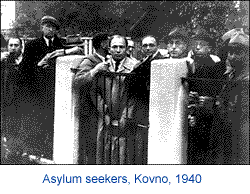When "Shangchai" was Yiddish for "life"
How Japanese-occupied Shanghai became a haven for Jewish refugees
by Sheldon Kirshner
AFTER ADOLF HITLER'S accession to power, Shanghai was the only place
Ulrike Ottinger's mother, a German Jew, was not aware of Shanghai's
peculiar status as a Jewish haven when she went into hiding in
Konstanz, a city close to the Swiss border. While Wilhelmina Weinberg,
Ottinger's mom, cowered in fear of being betrayed, thousands of German
and Austrian Jewish refugees streamed into that bustling Chinese
port, which had been colonized by Europeans in the 19th century.
Weinberg's ignorance is a source of irony to her 46-year old daughter, a
Berlin filmmaker, particularly now that she has made a movie about
Shanghai's place in Jewish history.
The 275-minute documentary -- Exile Shanghai, which was screened at
the Berlin Film Festival and the Jerusalem Film Festival before touching
down in North America -- skillfully filters this story through the prism
of interviews with former residents who now live in the United States.
Shanghai was settled by a succession of Jews -- Sephardic Jews in the
1840s seeking business opportunities, Russian Jews in the 1880s and
early 1900s fleeing pogroms and revolutionary upheaval, and finally,
German and Austrian Jews in the 1930s and 1940s escaping Nazi racism.
Ottinger, who produced, wrote and filmed Exile Shanghai, was drawn
to the topic after talking with a group of German Jews in Beijing who
had found refuge in China. She had been dimly aware of the exodus, but
not the details.
From them, she learned of the three separate but interlocking Jewish
communities which had emerged in Shanghai; of the varied institutions
the refugees had created; of their relationships with the Chinese
multitudes; of the deprivations they had endured when the Japanese
occupation authorities established a ghetto in 1943; and of their
departure from Shanghai in the aftermath of World War II.
Ottinger, along with Israeli producer Mark
Rosenbaum, started filming in the spring of 1996. By that point, she had
interviewed survivors in Israel and the United States, conducted
research at Yad Vashem, the Leo Baeck Institute and the Nahum Goldman
Museum of the Jewish Diaspora, extracted a wealth of information from
Germany's ambassador in China, and attended a conference in Berlin on
German-Japanese relations during that era.
The Chinese government was cooperative enough, but strangely, Ottinger
was not permitted to film the last remaining synagogues of Shanghai. "I
have no idea why," she said in an interview. Despite this inexplicable
prohibition, she sneaked in a few frames of shuls.
Since a Jewish community no longer exists in Shanghai, the synagogue
buildings have either been converted to other uses or fallen into ruin.
With the rise of Communism in China, the Jews left in droves, leaving
behind a distinct cultural legacy which the passage of time has almost
obliterated. "There was a strong anti-foreign, anti-colonial campaign
after 1949," she said. "The Chinese government did not distinguish
between Jewish refugees and colonialists."
The few Jews who remained in Shanghai and weathered the transition were
dedicated Communists. They were eager to build a new society in a
country which had been ravished by European and Asian imperialism.
As far as she knows, there are only about 2,000 "Shanghai Jews" left
today, and the vast majority reside in Israel, Canada, Australia and the
United States.
Three of them appear in Exile Shanghai: Gertrude Alexander, a
Viennese dress designer who set sail to China from Liverpool during a
German air raid; her husband Theodore, a rabbi who was raised in Berlin;
and Rena Krasno, a Russian Jew who was born in Shanghai and whose
pungent reminiscences lead off the film.
Ottinger also interviewed a couple in Haifa, a Chinese woman who had wed
a German-Jewish doctor. But they are not in the film.
Until recently, the flight of Jews to Shanghai was not exactly common
knowledge in Germany. But since the appearance of Ottinger's film, her
first on a Jewish topic, there have been articles in the German press
and Wannsee House -- a Berlin museum which documents the Holocaust from
its origins to its finale -- has organized a symposium about it.
Asked why she did not cut the epic-length Exile Shanghai, which is
expected to open in Canada in 1998, Ottinger sniffed, "This is not a
Hollywood film."
It certainly isn't.
 where a Jew persecuted by Nazism could emigrate without a visa or family
sponsorship.
where a Jew persecuted by Nazism could emigrate without a visa or family
sponsorship.
Sheldon Kirshner is a columnist based at The Canadian Jewish News.